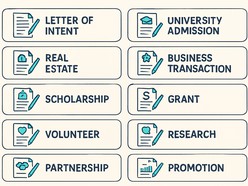
Letter of Intent
Create clear, professional Letters of Intent faster with free Google Docs templates. Save time, avoid mistakes, and make a great first impression.

Create clear, professional Letters of Intent faster with free Google Docs templates. Save time, avoid mistakes, and make a great first impression.

Download free editable Letter of Recommendation templates in Google Docs. Ideal for academic, job, graduate school, internship, and character references.

Download free professional cover letter templates in Google Docs. Learn how to write a structured, compelling cover letter that complements your resume and targets real job openings.

Download free reference list templates for resumes in Google Docs. Learn how to format professional references with clarity, accuracy, and strategic positioning.
Your resume is just one part of a complete application. A well-written cover letter and organized reference sheet provide context, reinforce credibility, and show attention to detail — especially when presented together with clear formatting.
This guide outlines how to write and structure both documents in Google Docs, even if you're starting from a blank page.
Why it matters: A mismatched or overly casual reference sheet or cover letter can undercut the professionalism of your resume.
What to do:
Use the same header (name, contact info, link to portfolio/LinkedIn) across all documents
Match font type, size, and margin spacing between resume, cover letter, and references
Keep file names clean and consistent (e.g., Firstname_Lastname_CoverLetter.pdf)
Templates in Google Docs make it easier to maintain this visual alignment without needing design software.
Why it matters: Hiring managers don’t want to reread your resume — they want to understand why you’re applying, what you offer, and what you understand about the role or company.
What to include:
Opening Paragraph: State the role and a clear reason why you’re interested
Body (1–2 paragraphs): Connect your experience to the role’s requirements. Focus on outcomes, skills, or values that align
Closing Paragraph: Reinforce your fit, show appreciation, and indicate you’re ready to talk further
Keep it concise: 250–350 words. Google Docs’ autosave and version control make it easy to tweak your letter for different roles without starting over.
Why it matters: A reference sheet is not just a list — it’s a supporting document that reflects your professionalism and relationships.
What to include for each reference:
Full name
Job title and company
Relationship to you (e.g., Former Manager, Colleague, Mentor)
Contact details (email and phone)
Tip: List 3–5 references. Only include people who’ve agreed to be contacted and who can speak to your work confidently.
Keep this document simple and readable. Use bullet spacing or soft dividing lines to separate entries.
Why it matters: You may apply to multiple jobs quickly — or need to tailor your cover letter or reference list on short notice.
How Google Docs helps:
Instantly update or duplicate documents for different roles
Share as view-only links for informal applications or referrals
Export polished PDFs when needed
Store all materials in one folder for easy organization
If a recruiter asks for references during an interview round, having a preformatted sheet ready shows you’re prepared and organized.
Why it matters: An overly casual letter or disorganized reference sheet can create a poor impression — especially in fields where communication and documentation are part of the job.
What to do:
Avoid clichés like “I am writing to express…” — use purposeful language
Be clear about the value you bring
Don’t over-explain or apologize for experience gaps — keep the focus forward
Use clean formatting, short paragraphs, and a single font family
Tone should match the industry: more formal for law, healthcare, or finance; slightly relaxed (but still professional) for creative roles.
Editable From Anywhere — Make quick changes or updates from any device
Templates You Can Reuse — Maintain a professional base you can adapt per role
No Design Software Needed — Structured formatting without graphic tools
Cloud-Based Access — Store alongside your resume, cover letter, and project docs for easy organization
Submitting a strong cover letter and reference sheet alongside your resume demonstrates more than interest — it shows intention. These documents give you space to explain your fit, speak to your character, and support your experience with credible names.
Even if you’ve never written these from scratch, a clean Google Docs template provides a professional framework to build on. With the right structure and content, your materials won’t just fill boxes — they’ll elevate your candidacy.